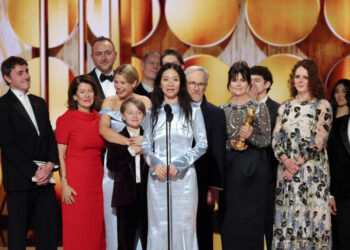The technologist and professor Mindy Seu was having drinks when her friend casually referred to the phone as a sex toy. Think about it, her friend, Melanie Hoff, explained: We send nudes or watch porn, it’s vibrating and touch-sensitive — it’s practically an appendage.
“What exactly is sex, and what exactly is technology?” Seu wondered. “Neither can be cleanly defined.”
Around the same time, in 2023, Seu had just published “Cyberfeminism Index,” a viral Google Sheet-turned-Brat-green-doorstopper from Inventory Press. Critics and digital subcultures embraced the niche volume like a manifesto — and a marker of Seu’s arrival as a public intellectual whose archiving was itself a form of activism. The cool design didn’t hurt. “If you’re a woman who owns a pair of Tabis or Miistas, you are going to have this tome,” joked comedian Brian Park on his culture podcast “Middlebrow.”
Still, the knot between sexuality and technology tugged at her. “Recently, my practice has evolved toward technology-driven performance and publication,” she said. “It’s not exactly traditional performance art, but I believe that spaces like lectures and readings can be made performative.” Though she wasn’t yet finished exploring this theme, she wasn’t sure how to approach it next — until an experiment by Julio Correa, a former Yale graduate student, sparked an idea. Correa had devised an Instagram Stories-based lecture format, and she immediately saw its potential. She reached out to ask if she could “manipulate” his idea into a performance piece, and would he like to collaborate?
Thus, “A Sexual History of the Internet” was born. The work is two things at once: a participatory lecture-performance conducted through the audience’s phones, and an accompanying, palm-sized, 700-plus-page “script” examining how our devices serve as bodily extensions.
The book isn’t exhaustive but instead a curated miscellany of non-sequiturs and the kind of dinner-party lore Seu delights in. Did you know that the anatomical structure of the clitoris wasn’t fully mapped until a decade after the invention of the World Wide Web? Or that the first JPEG — introduced in 1992 at USC — cribbed a Playboy centerfold nicknamed “Lenna,” which journalist and the author of the 2018 “Brotopia” Emily Chang called “tech’s original sin.”
The metaverse, web3 and AI — none of this is new, Seu said in her loft this past Saturday, hours before her West Coast debut at the Geffen Contemporary at MOCA. “But understanding the arc is helpful, especially how it’s tied to militaristic origins rooted in power, and how those same people were also confronted with sexuality.”
She’s just returned from a whirlwind tour — Antwerp, New York, Oslo, Madrid — with Tokyo next month. She splits her time between L.A. and Berlin, where her boyfriend lives, but for now, she’s staying put in what she calls her “bachelor pad on the set of a ‘90s erotic thriller,” inherited from a friend, the artist Isabelle Albuquerque.
The floor-to-ceiling windows high in a historic Brutalist artists’ complex overlook MacArthur Park and the downtown skyline. She’s offset the building’s cement with a childhood baby grand piano and her grandmother’s lacquer vanity with pearl inlay. That Seu marries the feminine and the spartan in her space feels intentional — a reflection of the dualities that animate her life and work.
Though she moved from New York three years ago, she resists calling herself an Angeleno — partly, she admits, because she never learned to drive despite growing up in Orange County. Her parents ran a flower shop after immigrating from South Korea. The household was conservative, Presbyterian and promoted abstinence. Like with many millennials, her sexual awakening unfolded online.
“I asked Jeeves how to have an orgasm,” she writes. “I sexted with classmates on AOL Instant Messenger. Any curiosities were saved until I could sneak onto my family’s shared ice blue iMac G3 in the living room.”
At 34, the very-online academic holds a master’s from Harvard’s Graduate School of Design and has taught at Rutgers and Yale before joining her alma mater, UCLA, as one of the youngest tenured professors (and perhaps the only one who has modeled for JW Anderson and Helmut Lang). Her first three years at UCLA have each had their crises — encampments, fires, ICE raids — yet her Gen Z students give her hope. “They’re so principled and motivated, even if it’s in a nihilistic way,” she said.
Online, fans declare their “brain crushes” on Seu, whose ultra-detailed spreadsheets have become unlikely catnip for TikTok. Vanity Fair dubbed her the rare cybernaut who “lands soft-focus photoshoots in niche lifestyle publications.” Her unusual power is the ability to move through different fields, Trojan-horsing her theories across academia, the art world, the lit scene, tech, fashion, et al. Sue’s notoriety continued to swell after appearing on the popular internet talk show “Subway Takes” with the standout zinger: “Gossip is socially useful, especially to women and the marginalized.”
“Mindy’s really good at bridging different audiences who might not read an academic text about the history of the internet but are interested in Mindy’s practice,” said Correa, Seu’s student-turned-collaborator. When the two workshopped their performance last year on their finsta (a.k.a. fake Instagram), they encountered one major hurdle: censorship. They had to get creative with their algospeak (like changing “sex” to “s*x”) to keep from getting banned.
“A Sexual History of the Internet,” designed by Laura Coombs, carries that collaborative ethos into its financial structure. Seu’s first book went through traditional publishing, where authors often receive about 10% and contributors receive fixed fees. This time, she wanted a citation model that compensated the 46 thinkers who shaped her understanding of the subject.
She approached Yancey Strickler, director of Metalabel, “an indie record label for all forms of culture,” and co-founder of Kickstarter. Seu’s original proposal waived all profits to collaborators. “Everyone got paid but her,” Strickler said. If she wanted the model to be replicated, he told her, it needed a capitalist backbone.
They landed on Citational Splits, where everyone who was cited joined a 30% profits pool, in perpetuity, across future printings (27 opted in). The remaining 60% goes to Seu and five core collaborators. Strickler likened it to music royalties or company shares: “Your presence increases the project’s value, and some of that value should flow back to you.”
Neither can name a publishing precedent. “It shows a profound, practical morality that underlies her work,” he said.
At MOCA, about 300 Angelenos braved an atmospheric river to sit in the darkened former police car warehouse bathed in red light. No projector, no spotlight. A pair of Tabis winks at her all-black-clad friend; a couple holds hands as Seu moves through the room. (“I intentionally wear very noisy shoes,” she said earlier.)
With the calm cadence of a flight attendant, Sue instructs everyone to put their phones on Do Not Disturb, sound and brightness to max and open Instagram to find @asexualhistoryoftheinternet.
The audience reads in unison when their designated color appears. What follows is a chorus of anecdotes, artworks and historical fragments tracing the pervasive — and sometimes perverted — roots of our everyday technologies. Hearing men and women say “click and clitoris” together is its own spectacle.
“From personal websites to online communities, cryptocurrencies to AI, the internet has been built on the backs of unattributed sex workers,” one slide notes. Sex work has long been an early adopter of emerging technology — from VHS to the internet — and the present is no exception. Two years ago, OnlyFans creators made more money than the total NBA salary combined; today, the company now generates more revenue per employee than Apple or Nvidia.
Seu ends with the widely known dominatrix Mistress Harley’s concept of data domination, a subset of BDSM in which her “subs” (a.k.a. submissives) grant her remote access to their machines. Seu tells the crowd that she has essentially done the same, “viewing the voyeurs” and taking photos of us throughout the performance, which are already posted to Instagram.
We walk out into the dark rain, wondering what exactly we witnessed — and realizing, perhaps, we’ve been witnessing it all along.
The post She’s the internet’s sexual historian. Her book will give you dinner party fodder for days appeared first on Los Angeles Times.




